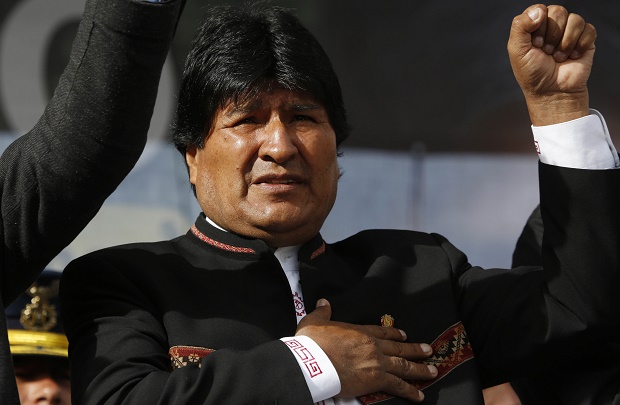Morales facing defeat in key Bolivia vote—partial results

Bolivia’s President Evo Morales sings his national anthem at a signing ceremony for the expansion of a road that connects the capital with the nearby city of El Alto, in La Paz, Bolivia, Monday, Feb. 22, 2016, one day after a referendum on expanding presidential term limits. Partial results Monday and unofficial “quick counts” indicated Morales’ bid to extend his presidency by amending the constitution appeared headed toward defeat. AP Photo
LA PAZ, Bolivia—Partial results Monday indicated Bolivian President Evo Morales faced defeat in a referendum on seeking a fourth term in power, but he sat tight pending results from his rural strongholds.
Morales, Bolivia’s first indigenous head of state, promised to respect the official results of Sunday’s vote on whether he can run for re-election to extend his time in office to 19 years.
READ: Bolivia’s Morales marks decade in office, eyeing more
But he insisted on waiting for full results to trickle in from rural areas where he has strong support, and from abroad.
“We are going to respect the results, whether it be a No or a Yes. We always have respected them. That is democracy,” he told a news conference.
Article continues after this advertisement“We are going to wait patiently for the final whistle from the electoral tribunal. We are optimistic.”
Article continues after this advertisementMorales, 56, wants to run for another five-year term when his current one ends in 2020, to continue a socialist program credited with improving the fortunes of poor indigenous groups.
READ: Bolivia’s Morales coasts to 3rd term as president
Partial official results from the Electoral Board with 46 percent of votes counted indicated about 57 percent for “No,” and 43 percent for “Yes.”
That was largely in line with exit polls published by private media late Sunday, which indicated Morales narrowly lost the vote.
With no official outcome, Morales said those distributing non-definitive information on the vote were essentially liars.
“People who use social media to spread lies are making the younger generations lose their values,” the president told reporters.
Longest-serving president
Opposition figures celebrated their projected victory.
Samuel Doria Medina—defeated twice by Morales in presidential elections—said: “We have recovered democracy and the right to choose.”
The early results “are showing strong support (for Morales) in the provinces, but in the main cities and even in the medium-sized ones, there is a strong ‘No’ vote,” said analyst Jorge Komadina.
However, “the forces of the opposition are scattered” and lack a single leader, he said. “They are a disparate grouping of leaderships and political intentions.”
Morales said he was prepared to give up on a fourth term if voters rejected the bid.
“With my record, I can leave happily and go home content. I would love to be a sports trainer,” he was quoted as saying in an interview with Spanish newspaper El Pais.
Alleging ‘US hoax’
In January, Morales became the longest serving president since Bolivia’s independence from Spain in 1825—rare in a country that has seen numerous military coups.
He is one of a generation of Latin American leftist leaders who champion “21st-century socialism.”
He has overseen robust economic growth, but opponents accuse him of presiding over corruption and investing in flashy infrastructure projects at the expense of health and education.
Since first taking office, he has been strongly re-elected twice.
Bolivia’s mineral- and gas-rich economy has more than tripled in size during his decade in office.
But his popularity has suffered from allegations that he used his influence in favor of CAMC, a Chinese engineering company that signed contracts worth $576 million with Bolivia.
The president rejected the allegations as “a hoax by the US embassy” to discredit him. He insisted he had “nothing to hide.”
Key ally and embattled Venezuelan President Nicolas Maduro echoed the US meddling charge.
Morales “has always won with 60 or 65 percent of the vote,” Maduro said. “The US Empire is behind this because it wants to destroy every independent, progressive and revolutionary process in Latin America and the Caribbean.”
A defeat could disrupt the remainder of Morales’ mandate by weakening him as leader of his Movement to Socialism party, a grouping of unions and social movements, analysts say.
“These results will probably cause an internal struggle to replace him,” analyst Andres Torres told AFP.
“It is very difficult to find a successor with his capacity to unite people in social organizations.”